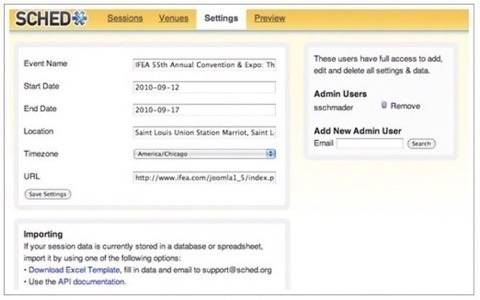Originally released as an unofficial calendar for SXSW in 2008, SCHED* quickly garnered a lot of praise for its events management database. As SCHED picked up clients, it started to use Google Docs to help get data into its system, doing so with such success that Google featured the company in a post on the Google Enterprise blog. Being featured in Wired, the New York Times, the Google blog – all good indications to a startup that you’re doing something right.

But getting some things right doesn’t mean you stop iterating. And SCHED has continued to work on improving its events management system. As part of the release of its Session Manager tool, SCHED has posted a series on its blog explaining some of the challenges it has faced through the process.
Although the Google Docs system makes data entry easy, it only does so “as long as you followed instructions and used the right formats. Too many people simply didn’t bother to do that,” writes SCHED’s Marvin McTaw, and the company found itself having to deal with numerous input errors. In order to help address this and to better validate data, the team decided to rewrite part of the code base – a “Google Document replacement” project.
Scrapping the Code and Starting Over
But not surprisingly, perhaps, the process – to “out-Google Google” – was very slow, and when SCHED experienced some staff turnover, the project came to a halt. When a new developer was hired, he made a decision that according to McTaw “would cause unexpected waves throughout our small company: completely scrap the replacement project.”
And despite having to walk away from all the time and resources invested in the replacement project, it was that scrapping that led to a big breakthrough for SCHED. The new approach was one of “thinking outside the box,” says McTaw. As the SCHED team had “always done things one way (using Excel and then Google Docs)” they had never really considered other solutions.
The new Session Manager is still free, and now addresses far more than just the user input errors the rewrite originally sought to handle, giving SCHED customers much more administrative control over the data and event sites.


















